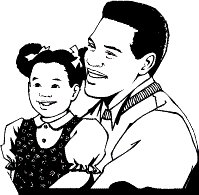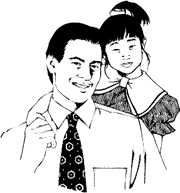|
Page: 2

|
Michael Kaufman says a big problem in our society is that we don't see parenting as real men's work. Kaufman, a former Atkinson social science and political science professor, has written extensively on men and men's roles (his most recent book is Cracking the Armour: Power, Pain and the Lives of Men). He says many studies have shown the problem of male violence against women and children often stems from men's absence from nurturing and caregiving. "Tribal societies in which men equally shared parenting had little or no violence against children or women or among the men."

Like Mandell, Kaufman isn't sure the fathering/father's rights movement has got its message right. "The Promise Keepers is a good example," he says. "Their message seems to be, 'Keep the promise [to be a father to your biological child], take responsibility, go home, and tell the wife who's boss.' The problem has always been with how men have defined their power. Our experience of power is contradictory. Because of the ways we've defined our powers, generally in a patriarchal way (politically, socially and economically), we're now experiencing incredible loneliness, isolation and pain. But perhaps as men learn to relinquish power and control we can discover our humanity."
If fear of the fathering movement revolves around the struggle for power, there are ways it can be overcome, suggests Ken Canfield. One way is to trade off roles. "Surely leadership within a family can fluctuate. People can trade power. I think it's time to escape pre-determined assumptions [about what roles men and women can or can't play]. I don't think we need to get caught up in ivory tower views of men and ideas about masculinity. Men need simple skills."
|

|

Sharing power and gender roles is often at the heart of many couples' problems, says York grad Bryan Phillips (PhD '87). A psychologist who specializes in couples counselling, Phillips says much of his experience with struggling couples centres around women finding a way to share the responsibility of parenting with their husbands. "Men have difficulties with gender stereotypes," he says. "There's a deep fear and concern in most men with their competence [in raising children]. It's really an irrational fear, but it's real. I think we need to meld ability with need...to see what each gender is capable of, each according to his or her strengths."
But critics of the fathering movement aren't only worried that the message is a return to a patriarchal model, they're also concerned about what the fathering movement may be doing to men. Phillips says the publicity the fathering movement has garnered may be creating unrealistic expectations among Boomer dads. "There's been too much hype in the fathering movement. One possible side-effect is that men in their forties or fifties may come to see their own experience as falling short. This could add to stress, to a sense of dis-adjustment because of their own parenting models."
|
|
|

While many critics of the fathering movement say nurturing is and should be genderless -- that the term "parenting" is a more accurate reflection of caregiving -- those in the movement itself say we shouldn't downplay the importance of difference. Fathering proponents argue gender difference adds to the richness of a child's life. Father boosters suggest we forget our stereotypes about men and masculinity and instead celebrate otherness as a positive value -- rather than see masculinity as a problem to be overcome, acknowledge it as a strength. Neither a mother's or a father's way of parenting is inherently better, only different.

Perhaps what ultimately is at stake for many in the fathering movement is the very nature of the family itself. If we continue to diminish dads we will strike at the very concept of what the term "family" means, they say. Fathering movement and father's rights groups are worried that uncaring court systems reinforce the "deadbeat dad" stereotype through poor rulings and outdated family law. As Randy Liberet, recently divorced spokesman for the Regina-based National Shared Parenting Association, commented in Maclean's (June 9, 1997), "It's been hell for fathers. There is a gender bias that mothers are caregivers and fathers are breadwinners. Our judicial system is 50 years behind the times."
For father crusader David Blankenhorn the situation is nothing short of a crisis. You sense he no longer has time for casuistry, for ivory tower discussions of gender roles, or niggling over the finer points of language. Instead, he says: "Father loss is a demographic loss. But even more important, it's a loss at the level of ideas. What we're really talking about is the dividing line between those who believe kids need fathers and those who don't."
|
Fathering Resources
Web Sites
www.fathers.com
Only a click away is a web site designed with fathers in mind. Put together by Ken Canfield at the Kansas-based National Center for Fathering, www.fathers.com provides material and links to many publications and places of interest. Anyone looking to brush up on fathering issues, searching out statistics, or digging for hands-on tips to being a better dad will find this site invaluable.
www.todaysparent.com
Parenting forums, pen pal pages -- the web site of Today's Parent magazine offers a place for Canadian families to meet and share ideas, advice and support. The site offers a valuable archive of parenting material.
Organizations providing
help for fathers
National Center for Fathering
10200 W.75th St., Suite 267
Shawnee Mission, KS 66204
The Psychology Foundation of Canada
480 University Ave. 2nd floor
Toronto, Ont. M5G 1V2
FatherCraft
73 Eccles St.
Ottawa, Ont. KIR 6S5
Dads Canada Initiative
105-396 Queens Ave.
London, Ont. N6B 1X8

Home
|
|
Father Facts
By the year 2000, estimates are that 50 per cent of U.S. children will be without fathers. In Canada, the figure is already approaching one million.
Single fathers make up 22per cent of lone-parent headed families. But they receive only about 1 per cent of child support.
Single parent families headed by fathers are among the fastest growing demographic groups in the U.S.
A child is five to six times more likely to suffer a life of poverty in the absence of a father.
In a 1996 Statistics Canada announcement of a major multi-year study on child health and parental influence the influence of fathers is not included.
Neither Health Canada nor Statistics Canada report any record of a study on fathering or male parental influence on a child's health, prior to 1996.
According to Statistics Canada, fathers do approximately one-third of child care in two parent families. However, they receive only about 1.5 per cent of child benefits, according to 1993-95 Human Resources Development figures.
|
|

